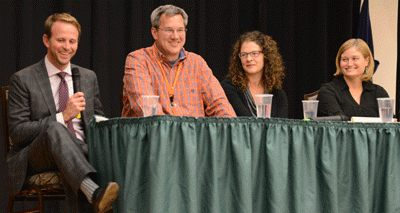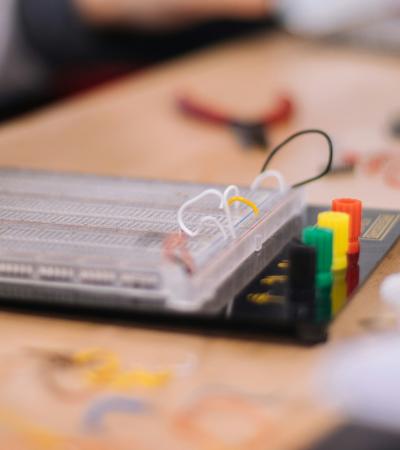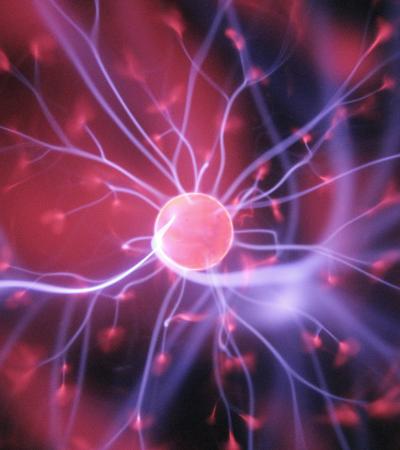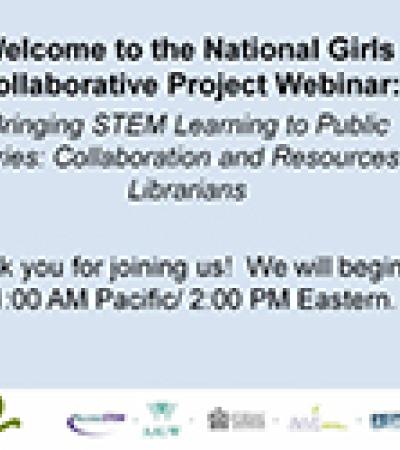
Hear Neurohr and Tracy Englert of the University of Southern Mississippi discuss their libraries’ Science Café programming in a free webinar, recorded on July 28, 2015.
What hot topics are occurring in your community and state, and how can your library help? The Oklahoma State University Library, winner of ALA’s 2015 Excellence in Library Programming Award, found a way to provide our community with the knowledge it wanted through our Science Cafés.
Science Cafés are informal public programs that highlight interesting, relevant and current science-related research presented by scientists. Libraries are a natural fit for Science Cafés since many are beginning to offer makerspaces and learning labs. Nationally, there is an emphasis on research and education in STEM (science, technology, engineering and math). Providing programming in these areas is a valuable service for communities.
OSU’s Science Café coordinator is Karen Neurohr, associate professor and community outreach and assessment librarian. “I actually learned about the Science Café through a chance encounter at an ALA Annual Conference when I met Tracy Englert, University of Southern Mississippi librarian, and asked, ‘What is one cool thing your library is doing?’ She described the Science Café, and I was eager to try it at OSU,” said Neurohr, who has over 15 years of experience in arts and humanities library programming.
The OSU Library launched Science Café in 2012 with two campus sponsors: the OSU Chapter of Sigma Xi, a prestigious international organization, and the OSU vice president for research. Monthly Science Cafés are held at the OSU library during the fall and spring semesters. The target audience is undergraduate students, but all programs are free and open to the public.
Since 2012, the library has hosted 18 Science Cafés with a total of 35 speakers. The attendance average is 81, but the impact of one particular Café spawned new partnerships and a series of five highly successful community programs held at Stillwater Public Library.
An outpouring of interest
On April 8, 2014, the campus Science Café, “Hydraulic Fracturing: Implications for Land, Water, and Communities” attracted 155 people, shattering previous attendance records. Word about this topic had spread, and people came from Stillwater and neighboring towns. The program, during which four OSU scientists discussed their research, lasted 35 minutes longer than normal due to audience interest. It was apparent from their questions that people were concerned about hydraulic fracturing and hungry for more information.
“After tabulating the program evaluation results, our community’s desire for timely information on this topic became even more apparent,” Neurohr said. “We were compelled to listen to our community and help fulfill their need for scientific information about hydraulic fracturing and oil and gas drilling.”
In Oklahoma the oil and gas industry is highly important to the state’s economy, affecting per capita income, state revenues and economic growth. However, Oklahoma is experiencing a surge in earthquakes, causing some people to oppose particular oil and gas production processes for safety and environmental reasons. The Oklahoma Geological Survey (OGS) reports the rate of magnitude 3 or greater earthquakes has increased from about 1 ½ a year to 2 ½ each day.
The OGS also reports that in 2013 Oklahoma’s seismicity rate was 70 times greater than rates before 2008, but now the rate is 600 times higher. The majority of earthquakes are most likely due to some processes associated with oil and gas production, namely the injection and disposal of wastewater into disposal wells. Stillwater is located in north central Oklahoma, one of two regions in the state that are experiencing the most earthquakes.
Science Cafés for the community
Aware of Oklahomans’ interest in oil and gas drilling and hydraulic fracturing, Neurohr proposed a community series to the April 8 speakers, who agreed to repeat their talks, and the Science Café sponsors: the OSU vice president for research and OSU Sigma Xi officers and science professors Kristen Baum, Stephen Clarke, Matt Lovern and Jeanmarie Verchot. Neurohr then spoke with Lynda Reynolds, director of Stillwater Public Library, about hosting the programs at the public library, and a new Science Café partnership between the campus and community libraries was formed.
“The series served the university’s land-grant mission and the library’s mission for expanding knowledge and serving community,” stated Dean of OSU Libraries, Sheila Grant Johnson. “Furthermore, OSU is an institution recognized by the Carnegie Foundation for the Advancement in Teaching with its Community Engagement classification.”
A series of four community Science Cafés were designed and held weekly at the public library. On May 29, Professors Todd Halihan and Chad Penn presented to 102 people the basic facts and research about the drilling process and hydraulic fracturing. On June 5, Professors Gina Peek and Dave Shideler presented to 55 people about community issues such as housing and infrastructure. On June 12, 50 people heard Professors Larry Sanders and Shannon Ferrell address costs and benefits, and basic facts and research about state and federal environmental laws that have implications for industry, communities and consumers.
“The OSU Library was the catalyst that provided a team of academics with opportunities to educate the public. Subsequently this team, which includes Neurohr, began to refer to itself as the OSU Hydraulic Fracturing and Communication Team (HFECT),” noted Peek. Neurohr appreciated the HFECT team’s assistance with program planning and implementation by serving as program speakers and moderators, helping craft evaluation questions, and addressing Q&As.
Based on program suggestions and audience questions, the June 19 program was designed as a forum with information about Oklahoma agencies and resources. An audience of 74 heard four speakers, each of whom drove an hour or more from various Oklahoma cities to participate: Commissioner Dana Murphy from the Oklahoma Corporation Commission; Mason Mungle, president of the Farmers Royalty Company and Oklahoma chapter of the National Association of Royalty Owners; Kent Wilkins, assistant chief of planning and management, Oklahoma Water Resources Board; and Lloyd Kirk, director of external affairs, Oklahoma Department of Environmental Quality. One attendee wrote, “I understand more about how complex this is and recommend that we maybe repeat the series or do similar ones.”
Feedback and evaluation
Throughout the series, evaluation forms captured community impact and shaped the structure of subsequent programs. A unique aspect of the evaluation forms was the inclusion of three open-ended comment boxes labeled respectively, “comments,” “suggestions” and “questions.”
“Typically evaluation forms include an open-ended comment box, but respondents’ meanings can be unclear,” Neurohr said. “By labeling and dividing comment boxes, our understanding of their meanings increased. The question boxes were especially helpful for a series like this, because from week to week, we opened programs by answering the written questions, thus increasing our dialogue with the community. The audience knew we were listening and attempting to find answers for them.”
Total attendance for the community series was 281. Overall, responders strongly agreed/agreed that their knowledge increased. They also said they planned to use the information to help inform others about the facts, and study the subject further.
“The Science Café series delivered using OSU professors at the top of their fields and experts from the State of Oklahoma,” said Angela Spotts, Stillwater citizen and co-founder of a local grassroots movement formed in response to the increase in earthquakes.” It was a very informative series that really didn’t take sides but showed the process involved thoroughly from a variety of perspectives. The depth of information given was impressive and yet presented so that most in the audience could understand.”
Science Café programs are sustainable, and the OSU Library organized a fifth community program at the public library on November 20. Two OSU Scientists, Todd Halihan and Tamara Mix, along with Oklahoma Geological Survey seismologist Amberlee Darold and State Rep. Cory Williams, House District 34, provided a variety of information including updates about research efforts, seismic monitoring and legislation; information about citizen science; and health risks associated with some aspects of oil and gas operations. This program attracted an audience of 85.
Planning your own Science Cafés
Libraries interested in Science Café programming may benefit from these tips:
- A coordinator is essential, but having a science background is not required. Create a program planning team who can help determine topics and speakers and assist with execution of programs. The Sigma Xi officers are dedicated team members and instrumental in programming success. Also, be open to new partnerships as programs evolve.
- Information about starting Science Cafés is available online from the WGBH Educational Foundation’s Science Café site and Sigma Xi. Coordinators can be resourceful in finding partners and speakers from Sigma Xi chapters, higher education, K-12 education, science museums, county extension agents or governmental agencies.
- If science speakers are difficult to find, libraries might modify the format by showing video clips of science speakers from credible sources, such as NOVA or Oklahoma State University’s OStateTV, which has filmed and posted several of OSU’s Science Cafés.
- The premise of Science Café is that scientists present informal talks about their research, but libraries could design other science programs using nonfiction books about science or science films and documentaries as springboards for discussion. Science programming can be aligned with awareness days or months, such as National Nutrition Month or Earth Day. Traveling exhibitions may offer partnership opportunities. When the OSU Library hosted the ALA traveling exhibition, “Dust, Drought, and Dreams Gone Dry,” a Science Café titled “Drought: Then and Now” was organized.
- Communication is essential. Several important elements stand out:
- Actively listen to your community and design programs based on their needs. Solicit feedback and continue to listen throughout the programs, modifying the program structure as needed, but always seeking to provide answers.
- Openly communicate with potential speakers about the program’s purpose, expected audience and average attendance. Share with speakers a sense of the community’s interest, the information they desire, and how Q&A will be handled during the program.
- Encourage civility with a structured format for the program’s Q&A. Provide index cards for the audience to write down questions; organize the questions by topic; and have a moderator read the questions.
- Use multiple methods of publicity including fliers, press releases, websites and social media. The OSU Library uses a template for Science Café fliers, which are displayed on the website maintained by OSU Sigma Xi officer Kristen Baum.
- Strategically invite campus and community organizations with related topic interests to be program partners. In exchange for being listed on program flyers and recognized at programs, they help publicize programs to their members.
- Offer attendees the opportunity to receive email notifications for future programs by using sign-in sheets. OSU’s coordinator maintains three email distribution lists used only for Science Café programs.
- Provide and extend educational information such as the OSU Library’s Science Café LibGuide that lists program information, links and questions and answers.
- Expenses for Science Café are minimal. Programs are held in the evening and typically last 90 minutes. Refreshments are not required but appreciated, and the OSU Science Cafés provide coffee, tea, water and cookies funded by a campus sponsor and also Library Friends’ Groups.
Clearly Science Cafés are a great way for libraries to engage with their community. Attendees’ comments for Science Café include, “Thank you to the library and OSU for this timely and informative program,” and “Please continue to offer these dialogues!” Stillwater Public Library Director Lynda Reynolds said, “This topic is of great concern to many in our community who appreciated being able to meet in one location to learn more and have the opportunity to ask questions and express their concerns through civil discussion.” The OSU Library is committed to continuing Science Cafés for the campus and community, and the number of science topics that can be explored is endless. Science Cafés can help libraries highlight scientific research, provide educational opportunities, and facilitate dialogue. Through Science Cafés, the OSU Library has strengthened collaborations, forged new partnerships, and provided timely and relevant information by responding to community needs.



